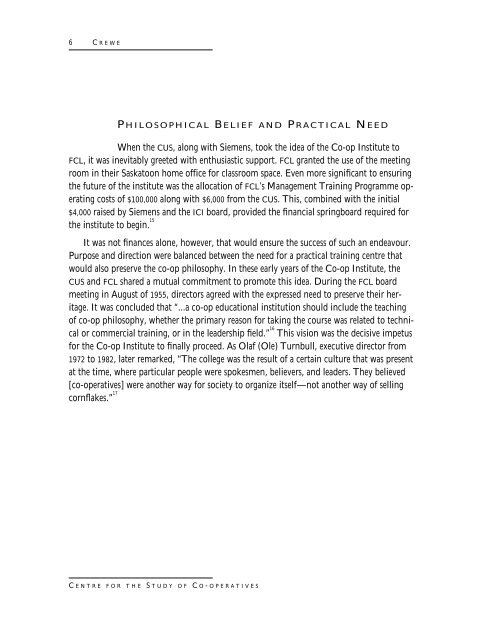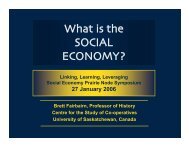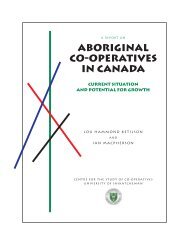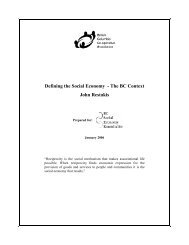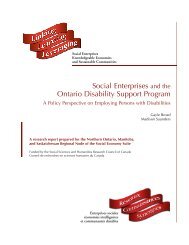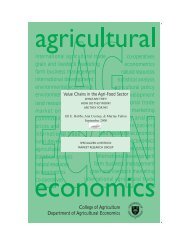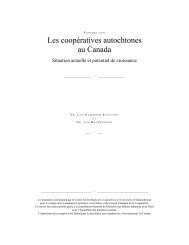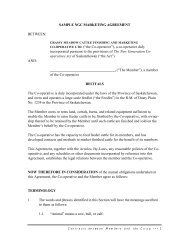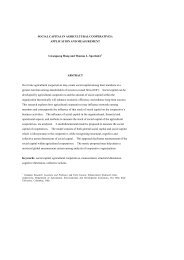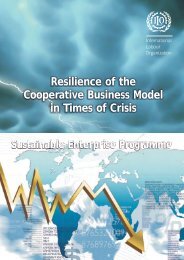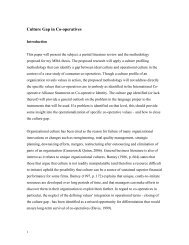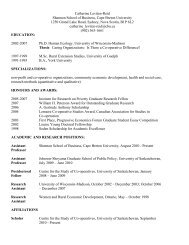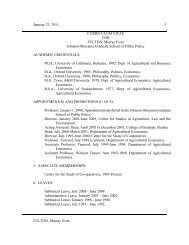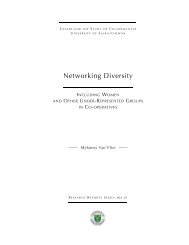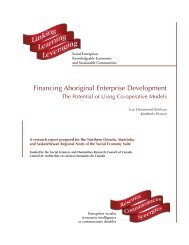Co-op College History - Centre for the Study of Co-operatives
Co-op College History - Centre for the Study of Co-operatives
Co-op College History - Centre for the Study of Co-operatives
Create successful ePaper yourself
Turn your PDF publications into a flip-book with our unique Google optimized e-Paper software.
6 C REWE<br />
P HILOSOPHICAL B ELIEF AND P RACTICAL N EED<br />
When <strong>the</strong> CUS, along with Siemens, took <strong>the</strong> idea <strong>of</strong> <strong>the</strong> <strong>Co</strong>-<strong>op</strong> Institute to<br />
FCL, it was inevitably greeted with enthusiastic support. FCL granted <strong>the</strong> use <strong>of</strong> <strong>the</strong> meeting<br />
room in <strong>the</strong>ir Saskatoon home <strong>of</strong>fice <strong>for</strong> classroom space. Even more significant to ensuring<br />
<strong>the</strong> future <strong>of</strong> <strong>the</strong> institute was <strong>the</strong> allocation <strong>of</strong> FCL’s Management Training Programme <strong>op</strong>erating<br />
costs <strong>of</strong> $100,000 along with $6,000 from <strong>the</strong> CUS. This, combined with <strong>the</strong> initial<br />
$4,000 raised by Siemens and <strong>the</strong> ICI board, provided <strong>the</strong> financial springboard required <strong>for</strong><br />
<strong>the</strong> institute to begin. 15<br />
It was not finances alone, however, that would ensure <strong>the</strong> success <strong>of</strong> such an endeavour.<br />
Purpose and direction were balanced between <strong>the</strong> need <strong>for</strong> a practical training centre that<br />
would also preserve <strong>the</strong> co-<strong>op</strong> philos<strong>op</strong>hy. In <strong>the</strong>se early years <strong>of</strong> <strong>the</strong> <strong>Co</strong>-<strong>op</strong> Institute, <strong>the</strong><br />
CUS and FCL shared a mutual commitment to promote this idea. During <strong>the</strong> FCL board<br />
meeting in August <strong>of</strong> 1955, directors agreed with <strong>the</strong> expressed need to preserve <strong>the</strong>ir heritage.<br />
It was concluded that “...a co-<strong>op</strong> educational institution should include <strong>the</strong> teaching<br />
<strong>of</strong> co-<strong>op</strong> philos<strong>op</strong>hy, whe<strong>the</strong>r <strong>the</strong> primary reason <strong>for</strong> taking <strong>the</strong> course was related to technical<br />
or commercial training, or in <strong>the</strong> leadership field.” 16 This vision was <strong>the</strong> decisive impetus<br />
<strong>for</strong> <strong>the</strong> <strong>Co</strong>-<strong>op</strong> Institute to finally proceed. As Olaf (Ole) Turnbull, executive director from<br />
1972 to 1982, later remarked, “The college was <strong>the</strong> result <strong>of</strong> a certain culture that was present<br />
at <strong>the</strong> time, where particular pe<strong>op</strong>le were spokesmen, believers, and leaders. They believed<br />
[co-<strong>op</strong>eratives] were ano<strong>the</strong>r way <strong>for</strong> society to organize itself—not ano<strong>the</strong>r way <strong>of</strong> selling<br />
cornflakes.” 17<br />
C ENTRE FOR THE S TUDY OF C O - OPERATIVES


